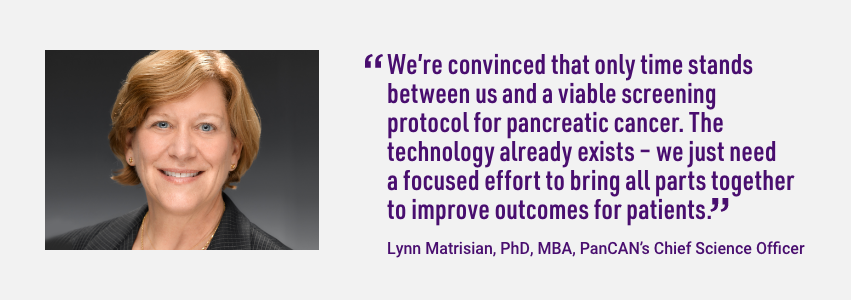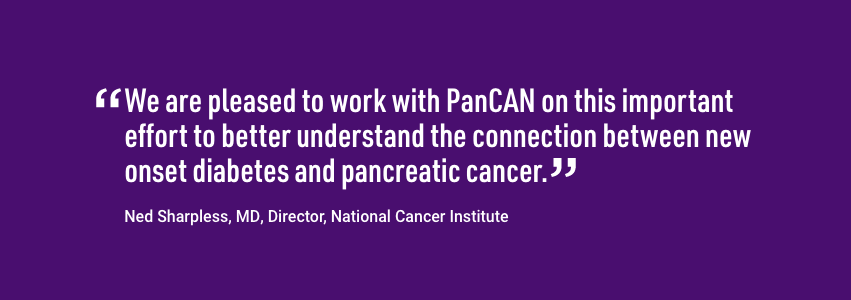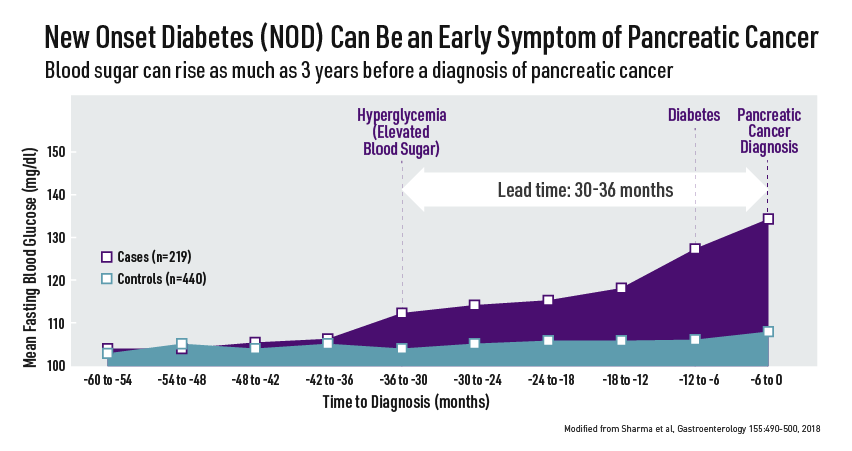Early Detection Initiative
Today, there is no screening test to detect pancreatic cancer early, when it’s more treatable. PanCAN is working to change that, thanks to donors like you. Earlier detection would mean that more patients could be eligible for surgery to remove their tumor, and it could lead to significantly higher survival rates.
Research suggests that in a small subset of people diagnosed with diabetes after the age of 50, their diabetes was caused by a pancreatic tumor. PanCAN’s Early Detection Initiative is a randomized controlled trial that is exploring this connection. Through it, we and our partners are studying the relationship between changes in blood sugar and weight, and the development – and detection – of pancreatic cancer.
From there, our goal is to develop a way to detect pancreatic cancer when it can be surgically removed.



What Is the Early Detection Initiative?
PanCAN’s Early Detection Initiative will study whether imaging at the time of new-onset diabetes leads to earlier detection of pancreatic cancer. Also, blood samples will be added to a collection maintained by the National Cancer Institute for analysis of future pancreatic cancer biomarkers.
With this information, we’ll determine whether we can develop a screening method that detects pancreatic cancer when it can be surgically removed.
How Is the Early Detection Initiative Different from Other Studies?
PanCAN's Early Detection Initiative:
- Focuses on new-onset diabetes, a symptom that is rarely recognized for pancreatic cancer
- Identifies pancreatic cancer cases that are not linked to genetic risk
- Will provide results that can change clinical practice through a forward-looking trial
Read more about how the study has been designed in a research paper published in Contemporary Clinical Trials.

Who Can Participate?
Eligible participants are identified through electronic medical record systems at participating healthcare institutions, with the intention of finding patients at the earliest indication of diabetes.
Are You At Risk For Pancreatic Cancer?
In addition to a new diabetes diagnosis, certain other risk factors may increase the likelihood that someone will get pancreatic cancer.
Learn More
PanCAN’s Early Detection Initiative Leadership
We’re working with the National Cancer Institute and an expert team of researchers, clinicians, statisticians and diagnostic specialists nationwide to design and conduct this study:
Study Principal Investigator
University of Texas M.D. Anderson Cancer Center
Co-Principal Investigator
Massachusetts General Hospital, Harvard Medical School
National Cancer Institute, Division of Cancer Prevention, Cancer Biomarkers Research Group
Co-Principal Investigator
University of Texas M.D. Anderson Cancer Center
Study Biostatistician
Fred Hutchinson Cancer Research Center
Kenner Family Research Fund
Co-Principal Investigator
Kaiser Permanente Southern California
National Cancer Institute, Division of Cancer Prevention, Cancer Biomarkers Research Group
Our Comprehensive Approach
Earlier detection of pancreatic cancer alone is not enough. We also have to accelerate new treatment options, because most people have a recurrence of pancreatic cancer – even when it’s detected early. Our Precision PromiseSM clinical trial platform is designed to get new, improved treatments to patients more quickly. Learn more about Precision Promise and all our research, scientific and clinical initiatives, all of which is made possible through supporters like you.
Any Questions?
Contact PanCAN Patient Services to learn more about our Early Detection Initiative and for personalized information and resources about the diagnosis and treatment of pancreatic cancer.
Support the Early Detection Initiative
Every dollar you give makes programs like the Early Detection Initiative possible.
If you’re interested in making a gift to support this initiative, please contact Esther Roehm at eroehm@pancan.org or 310-706-3307. We can’t do this without donors like you.





